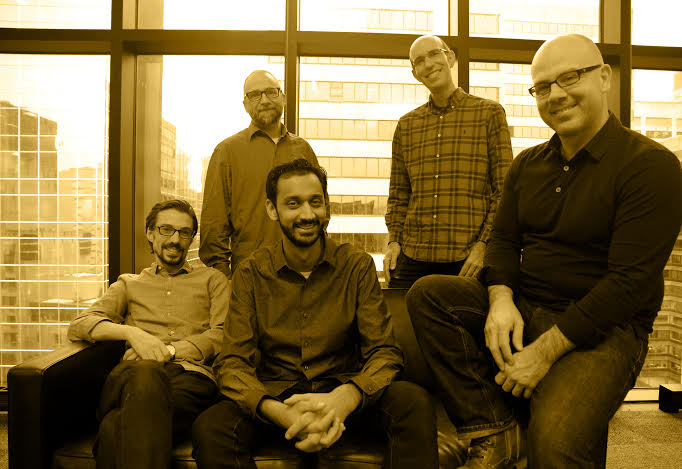By DAVID DUPONT
BG Independent News
Duniya means “world” in Arabic, and the term has been adopted by the Chadic language, widely used in Western Africa. As such it’s a fitting name for Ensemble Duniya. The percussion quintet encompasses a world of music.
Dan Piccolo, BGSU percussion professor, will host his fellow members of the group for a Monday night concert and Tuesday master class.
Ensemble Duniya will perform a free concert March 2, at 8 p.m. in Kobacker Hall on the Bowling Green State University campus.
The ensemble, Piccolo said, is dedicated to playing music that features instruments from world percussion with those of Western classical tradition.
The ensemble made its debut in 2013 at the Percussion Arts Society International Convention.
Neeraj Mehta brought the ensemble together to perform three concertos for world instruments and Western percussion. In addition to Piccolo, the other members are Anthony Di Sanza, Jonathan Ovalle, and Shawn Mativetsky.
Those three concertos still form the core of the ensemble’s repertoire.
The 4th Concerto for Tabla and Percussion Quartet by Payton MacDonald features Shawn Mativetsky, tabla soloist.
Piccolo said Mativetsky “is someone went down that rabbit hole” studying tabla, the main percussion instrument of North Indian classical music. It’s now his main focus.
Piccolo has also done extensive work on tabla, as well, including performing a concerto for orchestra and tabla. That comes into play in this piece where he plays the same rhythms in unison with the tabla on tom-toms and bongos.
The other pieces on the program were composed by Duniya members.
Anthony Di Sanza is the soloist on his own “Time’s Arc: 2nd Concerto for Darabukka.” The darabukka is a principal percussion instrument in Middle Eastern music.
Piccolo said he loves the variety colors in “Time’s Arc.” The score includes home made instruments and instruments Di Sanza collected while traveling around the world.
Ovalle composed Three Movements for Conga Soloist and Percussion Trio which features Neeraj Mehta.
Mehta’s background is emblematic of the group’s global reach. His family is from India. He was raised in Milwaukee and grew up playing orchestral music. He went to study in Cuba to study the island’s traditional music. “He’s a remarkable conga player,” Piccolo said.
Ovalle is also an expert in Afro-Cuban music.
This is the earliest piece in Duniya’s repertoire. Mehta performed it on his third doctoral recital at the University of Michigan with Piccolo and Olman Piedra, a BGSU graduate.
The final piece on the program is “Duniya,” a piece collectively composed by the members, and featuring each of them in turn.
Each of these works has its own instrumental set up. The groups of instruments will be arrayed on the Kobacker stage, and the percussionists will travel from one to the other for each piece.
That’s “eye candy” for percussion lovers.
The members are “all great guys,” Piccolo said. That camaraderie has played a part in keeping the ensemble together .
They assemble every year or so to present two or three concerts. Piccolo realized he was the only member of the group who had not hosted the ensemble. So he arranged a Sunday concert at Ohio University, the BGSU gig, and a performance at Capital University in Columbus Wednesday to conclude the mini tour.
Between these Duniya gatherings each of the members have active performing and teaching lives. Mehta teaches at Queensborough Community College in New York; Anthony Di Sanza teaches at the University of Wisconsin in Madison, Ovalle teaches at the University of Michigan; and Mativetsky teaches at McGill University in Montreal.
“Each time we come back to this, it feels more familiar and more mature,” Piccolo said. “This group is ready to take on some new projects, but it is nice to have these pieces you can really get to know over the course of a career with these guys.”
Duniya is working collectively on a new piece though Piccolo is not sure it’ll be ready for this week’s shows. They are also wrapping up a recording of their current repertoire.
The work is intentionally tied up with their teaching.
In the university setting, Piccolo sad, percussion programs focus on “the pillars of classical tradition”: keyboard instruments — marimba, xylophone and vibraphone; timpani; snare drum; and multiple orchestral percussion. Jazz students focus on the drum set. “But there’s an increasing interest in musics from outside the western tradition which is a whole can of worms,” he said.
No percussionist can master all those global traditions. So guest artists who are masters come to campus to perform. “These pieces are a way you could have the students play with that person but in their familiar territory of the Western percussion ensemble playing music that’s idiomatic to this other tradition and working with this soloist who is accomplished in that music,” Piccolo said.
“All have received some play outside the group which is the original idea.”

